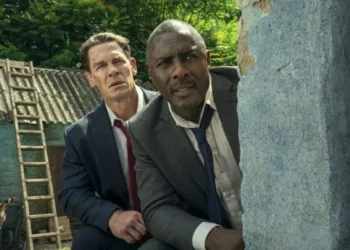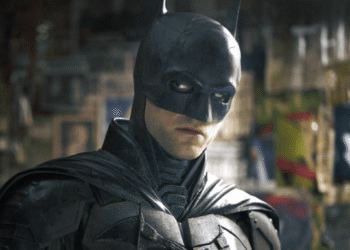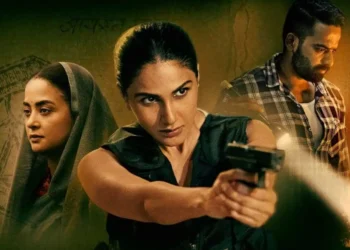More than merely a movie, Muthayya streaming on ETV Win embodies the essence of life lived without haste. Bhaskhar Maurya has created a feature film that is simultaneously simple yet deeply moving, and both understated and significant. Such a quality is truly uncommon. Numerous elements contribute to this movie’s charm.
Story
The film titled Muthayya centres on its main character, a gentle older gentleman portrayed warmly by Sudhakar Reddy, an erstwhile theatre performer possessing an acre of land in a village in Telangana. During the day, he earns a living doing various small tasks. At his core, he remains a devoted admirer of cinema, someone who has never abandoned his ambition of performing in movies. His sole ally in this improbable quest is Malli, played by Arun Raj, a youthful mechanic who supports his older friend’s aspirations with a combination of amusement, disagreement, and warmth.
They spend time together drinking, arguing, even engaging in drawn-out fights, while also creating phone videos, talking about movies, and other activities. The storyline is sparse, feeling more like a collection of personal stories or incidents. As a young man, Muthayya previously moved to Hyderabad, attempted to establish himself in the film industry, and returned having gained only experiences. Nevertheless, the desire to act endures within him. Despite his advanced age and the passage of time seeming to work against him, he is determined to attempt it again. The movie focuses less on the outcome of his attempt and more on the inherent significance of making the effort when society has dismissed you and your years present an obstacle.
Performances
The acting throughout the film exemplifies subtle and restrained technique. Sudhakar Reddy, recognized for his work in Balagam, delivers an even more authentic and naturalistic performance in this role. His speaking voice conveys the weight of many years of letdowns, and his gaze holds a sort of hallowed naivety characteristic solely of those who dare to dream. Arun Raj, playing Malli, serves as an ideal contrast through his portrayal of the impetuous and outspoken young man. The interaction between them appears so unforced that one easily forgets the filming process is taking place. It feels as though someone simply initiated filming during a genuine discussion.
Behind the scenes
The film features no antagonists and avoids using emotionally manipulative orchestral music designed to elicit crying. Instead, the audience is presented with something considerably more impactful: a movie where quiet moments carry significant weight, that portrays human countenances as delicate realities, and that recognises the grace in simply being, while harbouring a deep yearning.
The way Divakar Mani shoots the film is excellent precisely because it doesn’t call attention to itself. Extended, still camera placements enable discussions to unfold naturally. The editing avoids unnecessary transitions between shots or tight facial views. The perspective is observational instead of intrusive, which helps the viewer experience the subtle emotional pain alongside the characters. Similarly, Editor Sai Murali permits scenes to extend, allowing their meaning to become apparent without rushing. Karthik Rodriguez’s musical score respectfully employs folk elements and harmoniously complements the actors’ portrayals.
During one of the movie’s numerous touching moments, Muthayya and Malli record a video surrounded by buffaloes and countryside scenery; the elderly man performs a classic duet song as the surrounding natural world appears to regard them with puzzlement. This scene is equally amusing and touching, resembling the act of witnessing someone simply pursue their passion without concern for others’ opinions. While a subtle sense of irony is present in these instances, ridicule is completely absent. The movie does not treat Muthayya as a figure of fun; rather, he represents its core essence. The movie refrains from ridiculing him when he falters while attempting to act in a film he is financing himself. The value placed on his attempt surpasses any requirement for flawless execution.
Final Analysis
What transforms Muthayya from a pleasant depiction of everyday existence into something akin to poetic expression is its deliberate avoidance of providing convenient emotional release. Typically, in a different movie, the final scenes would lead towards a resolution designed to evoke tears and signify a character’s triumph. In contrast, at the moment the elderly character’s aspiration is finally fulfilled, the image simply fades to black. Without fanfare or elaboration. The ending lacks celebratory clapping, a sequence summarizing achievements, or an explicitly shown victory. The movie relies on the audience to grasp the significance of that instant without needing it to be explicitly stated. This represents one of the most sophisticated artistic decisions seen in contemporary Indian filmmaking.
Despite its other qualities, Muthayya also incorporates comedy. Indeed, the film employs comedy protectively, using it as a shield for its characters against life’s difficulties. For instance, a moment that initially appears set for dramatic revelation subtly shifts into a humorous situation. The transitions between different moods are managed so skilfully that their integration is barely perceptible.
The lines spoken, rendered in the gently rhythmic Telangana dialect, sound like everyday conversation. The language used never attempts to be overly witty or artificial. It simply exists naturally. When Muthayya utters the words, transliterated as “Ippudu vayasu ayipaaye ra… ippudem jeththaa?” and meaning “I have grown old, what will I do now?”, this statement resonates profoundly, carrying the sentiment of anyone who has contemplated whether their peak opportunities have gone by. In instances such as these, the movie transcends being merely a narrative. It transforms into something reflecting the viewer’s own reality or feelings.
The movie Muthayya feels intensely intimate and individual. Its themes include the regret associated with abandoning one’s aspirations, the persistent nature of optimism, and the understated dignity found in making an effort regardless. The film’s aesthetic appeal stems from its lack of artificial attempts to create beauty. Instead, it authentically portrays life in its true state: inconsistent, uncertain, and incomplete.
The director Bhaskhar Maurya (Sivarapalli fame) has demonstrated impressive control in directing a movie that doesn’t demand attention loudly but nonetheless creates a lasting and significant impact. At a time when even films depicting village life are often refined to appeal to city audiences, Muthayya remains authentically rural and perfectly conveys emotions without embellishment.
The film does not leave you feeling immediately overwhelmed with sadness. Upon leaving, you find yourself contemplating your own aspirations, those you set aside years before, and you might momentarily consider what revisiting them could entail. This exemplifies the type of filmmaking that lingers in the mind.























